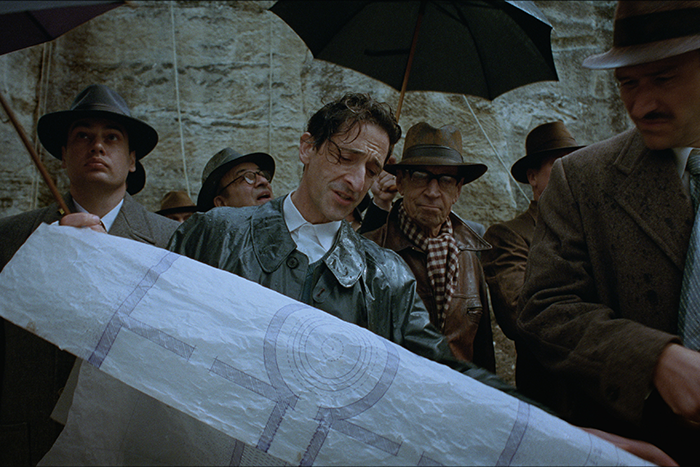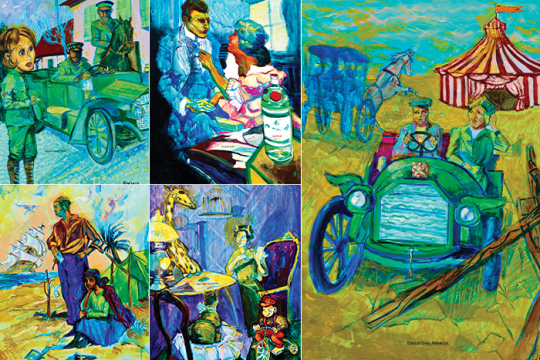
Brady Corbet's "The Brutalist" opens with Hungarian architect, Jewish Holocaust survivor, and soon-to-be freshly minted U.S. immigrant László Toth in the shadowy depths of a ship headed into New York Harbor. We follow László (played to haunting perfection by Adrien Brody) as he scrambles topside to catch a glimpse of the Statue of Liberty. But Lady Liberty is hard to pin down. The camera can't get her completely in frame. Instead, she floats around the edges, almost inverted. Like the post-war immigrant dream László will soon embark on, everything seems to be turned upside down.
With "The Brutalist," Corbet hopes to enter the pantheon of great filmmakers who have explored the American experience through the blood and toil of those who built it. Think epic films like "The Godfather," "There Will Be Blood," or "The Deer Hunter." Much like the brutalist architecture from which Corbet takes his title, his film can be opaque and unwieldy but also monumental and, at times, downright exhilarating.
László soon embarks for Philadelphia, where his cousin Attila (Alessandro Nivola) has a bed and a job waiting for László at his furniture store. Having arrived before the war, Attila has conspicuously shed his Jewishness to better assimilate. He adopted a new last name, Miller, and converted to the same religion (Catholicism) as his wife, Audrey (Emma Laird). At one point, Audrey suggests that László get his nose "fixed," a clearly antisemitic suggestion.
From the beginning, László is less willing to bend. When he and his cousin are hired by the rich scion of a prominent industrialist to redesign his father's library, László carries out his own vision for it, not heeding the consequences. When Harrison Lee Van Buren (Guy Pearce) arrives and sees the new design of his cherished library, he blows his top.
It isn't until László is toiling away on the literal slag heap that Van Buren seeks him out to apologize and offer him the opportunity of a lifetime. He wants László to design an enormous community center in honor of the industrialist's late mother: a building that will be both a tribute to his love for her and something that will stand the test of time.
Something "The Brutalist" depicts quite well is the silence surrounding many Jewish survivors' experiences during the Holocaust. László, his wife Erzsébet (Felicity Jones), and his niece Zsófia (Raffey Cassidy) all bear both physical and emotional scars from their experiences. Zsófia's silence is literal. She doesn't speak. The only time anyone tries to broach the subject of the Holocaust is when the wife of Van Buren's Jewish lawyer remarks, "we've heard things that would make your toes curl."
Brody's remarkable performance owes itself, in part, to his previous Oscar-winning turn as Władysław Spillman in Roman Polanski's "The Pianist." All the torment that Spillman endured at the hands of the Nazis is evident in the way Brody inhabits László. He seems unbreakable and yet eminently fragile all at once. Jones' Erzsébet is just as iron-willed, broken in body but never in spirit. Having survived, László and Erzsébet view their battered bodies as dispensable. What's important is that their souls remain free.
Over three and a half hours long with an intermission, "The Brutalist" challenges its audience. László's struggles to complete construction of the community center seem akin to Corbet's own seven years of tribulation to bring this monumental film to the screen. Like his character László, Corbet is unyielding, knowing the high stakes if his epic film is not well received. What truly matters to him is the art itself.
Thus far, "The Brutalist" has had a universally positive reception. Most recently, it was nominated for seven Golden Globes, including best picture, drama, best director and much deserved acting nods for Adrien Brody, Felicity Jones, and Guy Pearce.
A Jewish-American immigrant tale that defies easy explanation, "The Brutalist" is sure to enthrall, shock, unnerve, and stimulate discussion. But unlike the defiant Jewish architect at the center of its story, it appears destined to be recognized in its time.
Opens December 19 at Village East by Angelika in New York and Vista Theater in L.A.
Related Posts

Sam Griffin: Aftermath

Seven Jewish Comedians Sparking Joy

